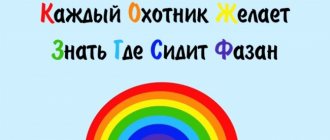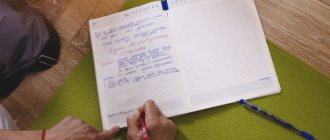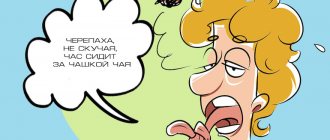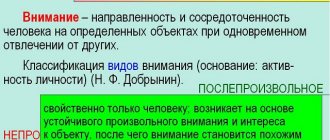The development of memory, attention and thinking is very important in the 21st century. We have to remember a lot of important things around the house, school, work, and so on. We are surrounded by a huge number of complex technical devices, which are constantly becoming more complex and their number is constantly growing.
Memory needs to be developed from childhood and continued to be trained as an adult. In this article, I have collected more than 20 effective exercises, games, courses and tasks for developing memory and attention.
- 8 Exercises for Everyday Workout
- 20 exercises to train memory and attention
- Memory development courses
- Games for memory and attention
The importance of memory and attention
Imagine you are walking around the city and you don’t know that this is your city, you don’t remember your first and last name, you don’t know where you live and where you work, you don’t know anything, you’ve forgotten everything. It's getting scary, isn't it? Terribly scary.
Let's not reach this extreme point, let's study, develop our memory and attention.
Man is a very cunning and lazy creature, and if he is not moved and developed, he will be worse than a monkey. So our brain, if you don’t load it, it starts to get lazy and tells you: I don’t remember, I forgot, and so on.
Remember your school days. For nine months your brain works without rest, it learns a lot of interesting and useful things, learns poems and songs, studies history and mathematics. The brain is tense, it is always at work.
Then for three months of vacation your brain rests, does nothing, is lazy. And the time comes again, the first of September, it’s time for you to go to school. Oh no, your brain says, I don’t want to, but it’s starting to get lazy and it’s a difficult period to get it to work with the same productivity as those nine months.
From birth to old age, it is necessary to develop memory and attention. Sometimes people think that they are retired and don’t need to do anything. They stop reading, counting, and engage in simple everyday life. The brain begins to get lazy and what does this lead to?
Pensioners often forget everything: they put the kettle on to boil and forgot, they went to the store and forgot what they needed to buy, they came to the pharmacy and don’t know what medicine they need.
Classification of memory according to the time it saves information
Based on the duration of information storage, they distinguish between instantaneous, short-term (and operational memory, which was previously identified with short-term, but is now more often considered its operational component), and long-term memory.
Instant memory is stored for a very short period of time, up to 3 seconds, and its task is to perceive information from the senses as fully as possible and, without processing, transfer it further to short-term memory.
Short-term memory retains information in a small volume for a short time (about 30 seconds) (on average about 7 objects). At this stage, a decision is made about whether it needs to be transferred to long-term memory. The important thing is that without repetition, information is forgotten over time, “erased.” Short-term memory “selects” from the received data the most important thing, something that can be useful, a certain generalized image.
Random access (working) memory is an active process that allows you to work with information stored in short-term memory, manage it, and organize it. This is a kind of intermediate form of memory (between short-term and long-term), acting depending on a certain period of completion of the assigned memorization task (seconds or days). Once the task is completed, the information is erased. Thanks to this memory, we, for example, pass an exam in an unloved subject, after which sometimes we completely forget everything we have learned. Working memory also manifests itself when, in response to an unexpected question, we not only answer, but also, holding the question in our heads, plan what we will say next, how we will develop our thought. Thanks to it, we remember purchases and roughly calculate the amount, moving towards the checkout, and so on.
Long-term memory can store information for a long time, sometimes throughout life. True, we still need to extract it from storage. For long-term memorization, you need meaningful, well-structured information associated with already “rooted” knowledge.
As a rule, it is the inability to quickly and effectively carry out the work of comprehending new material, structuring it and linking it with existing knowledge that causes difficulties in transferring material from short-term memory to long-term memory and, accordingly, complaints about weak memory . Information placed in short-term memory must be “decoded” in order to be remembered, that is, it must become understandable to our brain.
Efficiency of memory and attention development
Many people are born with a good memory and the ability to concentrate on little things.
If you are not lazy and train your memory and attention, you can achieve great success in life.
Some people need to work hard on themselves, on their memory and concentration, in order to achieve at least something in life.
To increase memory and attention productivity you need to:
- Concentrate on one thing. If you are listening to a lecture or sitting at a meeting, do not correspond with someone on the phone, listen carefully to the person speaking in front of you. You need to listen to him as carefully as possible and not be distracted by trifles. In the evening, be sure to remember today’s lecture and try to recall it in memory down to the smallest detail.
- Proper nutrition for the brain is very important. Do not eat fast foods and snacks on the run; this is harmful to both your brain and your body. A proper diet should include the following foods: vegetables, fruits, dried fruits, nuts, honey, cereals, herbs.
- Don't overload your brain. If you feel tired, give your body a rest, a tired brain does not perceive new information well.
- Never overload your brain with unnecessary, unnecessary information. Load it only with useful and truly important information.
- Be sure to take walks in the fresh air - this is also very important for the proper functioning of your brain. The brain must receive oxygen. It's good if your walks in the fresh air are active. You can engage in different sports or simply relax actively.
In the early stages of dementia, the following factors are important:
For a person with dementia, it is important to create a quiet, homely, familiar atmosphere. Moreover, the circle of people with whom he communicates must be constant. This will eliminate feelings of anxiety, nervousness, confusion and excitement. It’s a good idea to create a daily routine and stick to it strictly.
Lyudmila Zhilevich: “Unfamiliar faces, new situations that a person is no longer able to remember, can provoke an acceleration of the development of the disease, and also negatively affect his condition.”
The first symptoms of dementia are not a reason to give up exercise. This could be walking in your favorite places, simple work in the garden, physical therapy exercises (at least 150 minutes of anaerobic exercise weekly).
Life should be full of various events and types of intellectual activity. You can read, solve crosswords and scanwords, play chess or checkers, discuss past cultural or political events.
It is important for the patient to have a hobby, but it should not only be a source of positive emotions and bring pleasure, but also stimulate cognitive and mental abilities.
A sick person's diet should contain foods that lower cholesterol levels. For example, barley, legumes, blueberries. Instead of butter, it is better to give preference to vegetable oil. The menu can include fermented milk products, lean meats and poultry, lean fish, seafood, and sauerkraut. To improve the taste of dishes, the use of seasonings (sage, cinnamon, turmeric, saffron) is allowed. But it is better to reduce salt consumption to a minimum. You should definitely drink the daily amount of clean water (at the rate of 30 ml per 1 kg of weight). It is better to cook by steaming, you can bake or boil.
If you follow all the doctor’s recommendations, you can slow down the progression of the disease, which means significantly improving the patient’s quality of life and delaying severe manifestations of dementia. At the same time, people who have a hereditary predisposition to developing the disease should pay special attention to prevention: lead a healthy lifestyle, do exercises daily for mental exercise, and control blood cholesterol levels.
An important point is to create comfortable conditions so that a person suffering from dementia remains independent for as long as possible. The best therapy is to spend more time with elderly relatives, surround them with love, care, and help them feel useful and needed, the specialist added.
Memory development courses
Useful courses to improve memory, concentration and brain function:
Development of memory and attention in a child 5-10 years old
The purpose of the course: to develop the child’s memory and attention so that it is easier for him to study at school, so that he can remember better.
After completing the course, the child will be able to:
- 2-5 times better to remember texts, faces, numbers, words
- Learn to remember for a longer period of time
- The speed of recalling the necessary information will increase
Sign up for a courseRead more
Super memory in 30 days
Development of memory without interruption from everyday activities and worries. Most of the exercises in this course are aimed at training memory in natural conditions, because we need to remember quickly and accurately, regardless of the situation around us. There is no need to specifically set aside time for memory training. Train it at home, at work, on the road. Learn to remember the necessary information from the first lesson.
Sign up for a courseRead more
How to improve memory and develop attention
Free practical lesson from advance.
Sign up for freeRead more
Secrets of brain fitness, training memory, attention, thinking, counting
Games and exciting exercises for the development of the brain, memory, concentration, creativity, which will be sent to your email within 30 days after subscribing. As a bonus, you will receive lessons from their other courses.
Sign up for a course
Speed reading in 30 days
For those who want to read a book a day, develop faster, speed up brain function and develop memory for memorizing text information. Increase reading speed by 2-3 times every 30 days.
Sign up for a courseFree lesson
We speed up mental arithmetic, NOT mental arithmetic
Develop memory and attention in mental calculation. In 30 days we will teach you how to count complex examples in your head for addition, subtraction, multiplication, division, squaring, and so on.
Sign up for a courseRead more
Money and the Millionaire Mindset
We learn to count money, increase income, minimize expenses, invest money, and avoid mistakes when investing. The course expands consciousness and teaches you to think like a millionaire.
Sign up for a courseRead more
What is dementia
With the development of dementia, a person’s mental abilities decrease, existing knowledge and skills are gradually lost, and the ability to learn is lost.
Thinking, orientation, understanding, counting, learning, language and judgment are impaired. There are many reasons why dementia develops. Dementia can be triggered by endocrine and vascular pathologies, depression, certain infections, traumatic brain injuries, brain tumors, alcoholism and drug addiction. Additional risk factors for developing dementia include:
- heredity. Moreover, the risk increases if the pathology in close relatives developed before the age of 65 years;
- obesity;
- lack of active intellectual activity.
Games for memory and attention
Educational games and exercises are a great option not only to pass the time or have fun, but also to improve memory. Let's look at some of the most powerful exercises.
Educational game “memory matrix”
Remember the location of the shaded fields in 1-2 seconds, and then reproduce the shaded fields from memory. The game trains visual memory and memorization speed.
Play now
Anagrams will help develop such qualities as: attention, concentration, speed of thought, speed reading. In this game you have to choose 1 option out of 4, in which only those letters that are part of the given word are mixed. Each round a new word is given. Remember that time is limited! The faster you look for the answer, the more points you will get at the end of the game.
Educational game “Letter span”
A game to develop memory capacity. The screen shows letters that you need to have time to remember and reproduce in the right order.
Play now
The Schulte table is one of the most effective exercises for developing the brain, attention, concentration, and accelerating visual search. This exercise is also the most popular exercise for developing speed reading. Schulte tables usually consist of randomly placed numbers or letters. The number of cells in tables also varies and most often they are 5x5 elements in size.
Educational game “Memorize and call”
This educational game is aimed primarily at developing attention span. The more different elements we can remember at one time, the better.
A table with numbers will be shown for a few seconds; you need to have time to remember all the numbers and reproduce them in ascending order.
Play now
Search for numbers and letters
Try also to practice searching for letters. These exercises are great for developing peripheral vision and speed reading. You can read more about this exercise in the separate article Search for letters and in the article with the simulator Search for numbers and numbers.
Educational game “Remember and find”
A game to develop working memory and memorize objects. For a moment, a set of objects is shown that you need to have time to remember, and from memory determine which object has changed.
Play now
Reading by sighting
We have also developed another useful simulator that is suitable for both the development of lateral vision and the development of speed reading. When you click on the “Random phrase” button, the simulator displays a random sentence for 1-2 seconds. Try to look at the entire line:
Educational game “Find a coin”
- Develops memory capacity
- Improves visual memory
- Improves spatial memory
Open the cells on the screen and find coins. The cell closes after opening, so you need to remember which cells have already been clicked on.
Play now
Tag
Tag is a great way to exercise your brain throughout the day! This is a game for developing thinking . The game of tag is a square board divided into 16 equal square sections. You have 15 square dominoes at your disposal, numbered accordingly. The dominoes themselves are randomly mixed inside the box.
The essence of this game is to put the dominoes in order, namely to place the numbers one after another from top to bottom, from left to right, therefore, the empty square should be from the bottom to the right. The game will help you develop logical thinking and memory, because it is useful to remember various tricks and combinations. You will also be able to develop the ability to calculate moves ahead without making mistakes. Shall we play?
Why do you need to take into account the features of your memory?
We are all different and remember information differently. It is easier for some to perceive information by ear, for others it is necessary to read it, that is, to see it, and for others it is necessary to read it, always emphasizing it, and say it out loud. Sometimes it is the smell that brings back memories of long-forgotten events. As a rule, some type of figurative memory (the so-called memory for images formed in the process of perception and helping us remember, imagine the image of what was perceived) dominates. Based on it, it is easier for us to remember the material. Your task is to understand how this happens for you and to put into practice the strengths of your perception and memory. But remember: when memorizing, the first stage is concentration.
Thus, tables, diagrams, and visual aids help those with good visual memory. While listening to a lecture, it is advisable for them to take notes and notes. It is preferable for them not to listen to others read, but to read themselves, highlighting the most important passages.
Those with good auditory memory should especially avoid sound interference and irritants when working with material that needs to be remembered. They need silence to concentrate and remember. They memorize the lecture “vocally” and strengthen their memorization by retelling what they remember out loud and reasoning out loud. Notes help them, of course, but rather because this also involves visual (figurative), motor, verbal-logical, and possibly emotional memory, enhancing each other’s effect.
Those with good motor (motor) memory remember through movement, therefore, by drawing diagrams and graphs, taking notes, and performing practical tasks, they remember the material more easily.
Exercises to improve memory
The exercises are done out loud with eyes closed. If you have an assistant, let him record the completion time on paper. Each task separately, then we will calculate the total time.
Here is a set of exercises to improve memory, choose what you like:
1. Count from 100 to 1
2. Name any 20 female names
3. Now 20 men's
4. 20 food products (cereals, fruits, vegetables, berries...)
5. 20 nouns starting with a specific letter (your choice). Today A, tomorrow B, and so on
6. 20 any animals
7. Open your eyes and count again from 100 to 1
These exercises are suitable for both adults and children. They can be performed anywhere: in transport, lying in bed, standing in line...
If you liked this complex, do it at least the first time with fixing the time, then after a week of daily exercise, the execution time will be reduced by at least half.
As a result, it will take 4-5 minutes. However, years later, your brain will be grateful for these 5 minutes a day. The longer you engage in intellectual activity, the less likely you are to develop Alzheimer's disease and other memory disorders.
How to develop visual memory
To develop visual memory, you need to learn to notice the smallest details. Developing the skill of such memorization will require mental effort, but gradually memorization will begin to occur as if automatically. What needs to be done for this?
- Cultivate the habit of carefully examining something in detail (for example, a painting, a picture, objects on a table, the contents of a box, the interior, the appearance of someone or something). Allow a certain time for this exercise, for example 30 seconds. Your task is to remember everything you saw as completely and in detail as possible and describe it, trying not to miss anything. Try to mentally “see” the picture you were supposed to remember.
- Before going to bed, try to mentally “see” what happened during the day, or within a few hours, trying not to miss anything.
- Try to mentally “see” the page you just read or an episode from a movie you watched.
- Remember more distant events, try to remember what happened a little before an event, during it and a little later: remember the chain of events, restore it in your memory like a film.
- Try playing memory matrix games.
It’s worth talking separately about some of the techniques we know for memorizing material:
- Mechanical repetition. It should be remembered that mechanical memory, devoid of comprehension, does not bring the desired result, and a lot of effort and time is spent on memorization. However, entire generations memorized poems for the rest of their lives by repeating them out loud over and over again.
- A logical retelling that involves comprehension, systematization, highlighting the main thing, and building semantic connections. This technique is much more effective.
- Using figurative memorization techniques using diagrams, pictures, graphs.
- Memorization by highlighting (arranging) according to one common feature.
- Using underlining (highlighting) important places in information; writing presentation plans, cheat sheets. In this way, active comprehension occurs and motor memory is also involved, which improves memorization.
- Mnemonic techniques.
Practical advice . If you want to remember a name when you first meet, look carefully at the person, note to yourself something special that distinguishes him, something that will attract your attention. Mark this in your thoughts in some word or image. When they call you a name, also be careful and repeat it out loud before you say yours. If you smell the perfume, pay attention to it, associating it with the name and image. If there is a handshake, still be careful and connect its strength, duration, and your feelings with the information already received. If the name of a new acquaintance coincides with the name of someone close to you, note this fact; you can do this out loud if the acquaintance takes place in an informal setting. The more attention you pay and the more sensors you connect, the better you will remember.
However, it is important not only to use the types of memory that dominate you, but also to develop the “lagging ones.”











